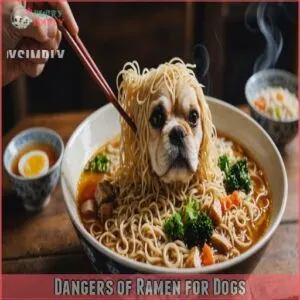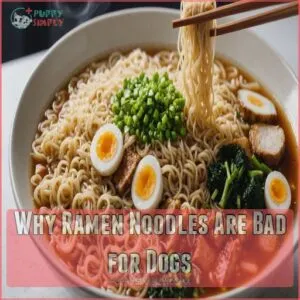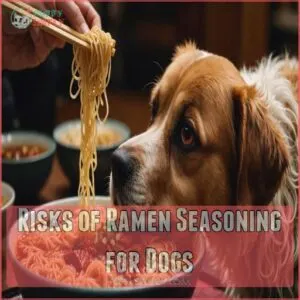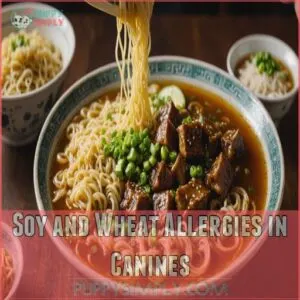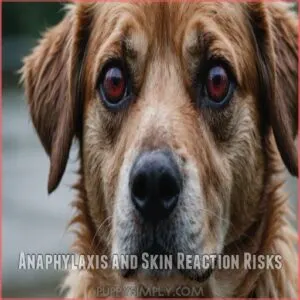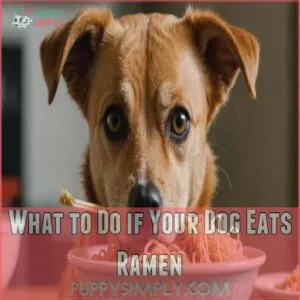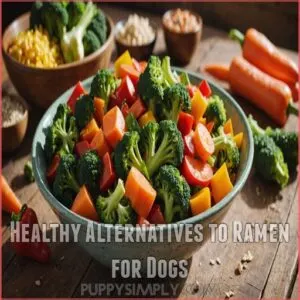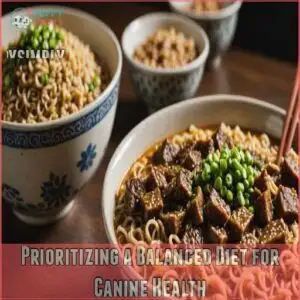This site is supported by our readers. We may earn a commission, at no cost to you, if you purchase through links.
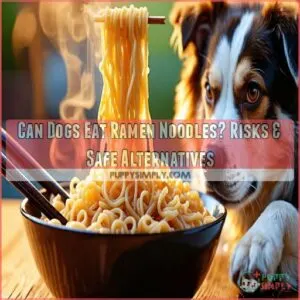 When you’re slurping up ramen noodles, your dog might give you the puppy eyes, but resist the urge to share.
When you’re slurping up ramen noodles, your dog might give you the puppy eyes, but resist the urge to share.
You might wonder, "Can dogs eat ramen noodles?"
Unfortunately, ramen’s not suitable for your furry friend.
The high sodium content is a major concern, and the seasonings could be toxic, including MSG, garlic, and onion.
These ingredients spell trouble for canine tummies.
Besides, those noodles are just empty calories with no real benefits for dogs.
Stick to dog-safe snacks and keep your pooch healthy.
Curious about the tasty alternatives that are safe for your dog?
We’ve got you covered!
Table Of Contents
- Key Takeaways
- Dangers of Ramen for Dogs
- Why Ramen Noodles Are Bad for Dogs
- Risks of Ramen Seasoning for Dogs
- Ramen Allergy Triggers in Dogs
- What to Do if Your Dog Eats Ramen
- Healthy Alternatives to Ramen for Dogs
- Prioritizing a Balanced Diet for Canine Health
- Frequently Asked Questions (FAQs)
- Are ramen noodles okay for dogs?
- Can dogs eat noodles?
- Can dogs have hard noodles?
- Can dogs eat ramen lettuce?
- Can ramen noodles cause long-term health issues?
- What are signs my dog ate ramen?
- How much ramen is toxic to dogs?
- Is it safe to give plain ramen occasionally?
- Can ramen noodles worsen my dogs digestive problems?
- Conclusion
Key Takeaways
- Don’t give your dog ramen noodles; the high sodium and toxic seasonings like garlic and onion can harm their health.
- Ramen noodles offer no nutritional benefits to dogs, just empty calories that can lead to weight gain.
- If your dog accidentally eats ramen, watch for signs like vomiting or lethargy and contact your vet if needed.
- Stick to dog-safe snacks and prioritize a balanced diet to keep your furry friend healthy and happy.
Dangers of Ramen for Dogs
You might think sharing a few ramen noodles with your dog is harmless, but the risks are more than you’d expect.
With sky-high sodium and sneaky seasonings like garlic and onion, ramen poses a tasty but dangerous temptation for your canine friend.
High Sodium Content Risks
Sodium, lurking in ramen noodles, spells trouble for your furry friend. It can cause sodium-induced dehydration, affecting their heart and leading to electrolyte imbalances. Too much salt, and you might see sodium toxicity symptoms.
Keep these risks in mind:
- Sodium limits for dogs are low.
- Avoid sodium poisoning in dogs.
- Watch for hypernatremia in dogs.
- Just like with Takis, understanding the risks of high-sodium snacks is crucial when evaluating dog snack options. Prioritize dog health risks management.
Toxic Seasonings and Additives
Your dog’s noodle nosh might seem harmless, but ramen’s seasonings are a slippery slope!
MSG dangers and onion and garlic toxicity can wreak havoc on your pup’s health.
Garlic risks and food additives found in ramen can harm, causing neurological issues and allergies.
Keep those preservatives far away, and stick to safe dog food to keep tails wagging safely.
Impact of Excessive Sodium on Canine Health
Someone once said, "too much of a good thing can be bad," and that’s especially true for sodium and your dog.
Excessive sodium, or a Sodium Overload, wreaks havoc on their delicate dog fluid balance, leading to Canine Hydration issues and potentially serious dog heart problems.
Consuming high-sodium foods like ramen noodles, which contain a high sodium content, can lead to dehydration, electrolyte imbalance, and hypernatremia in dogs.
Electrolyte Imbalances can also arise, causing digestive issues.
Remember, a dog’s sodium allowance is far less than ours! Keep ramen far away; it’s a sodium chloride toxicity time bomb. Prioritize their health—they’ll thank you for it!
Why Ramen Noodles Are Bad for Dogs
While you might think ramen noodles make a tasty treat for your dog, they’re packed with unhealthy carbohydrates and empty calories that do more harm than good.
These noodles are made with refined flour and oil, making them difficult for dogs to digest and leading to unnecessary weight gain.
Unhealthy Carbohydrates and Empty Calories
Ramen noodles might seem harmless, but for dogs, they’re nothing but trouble.
Loaded with unhealthy carbohydrates and empty calories, these noodles don’t align with your pup’s nutritional needs.
Instead of supporting energy, they contribute to weight gain and potential health issues.
Keep dog food options nutritious, focusing on a healthy balance of carbs versus protein.
Aim for safety and satisfaction.
Refined Flour and Oil Content
Imagine ramen noodles, those tangles of temptation. They’re fun, but for dogs, they’re a no-go.
Made with refined flour and oil, these noodles wreak havoc on your furry friend’s tummy.
If you’re looking for a safer option, consider exploring dog safe ramen alternatives Everysimply Dog Safe Options.
Watch out for:
- Digestive Issues: Dogs struggle with refined flour.
- Weight Gain: Oil content contributes to obesity.
- Nutritional Value: Low, offering little benefit.
Keep them away!
Consequences of Consuming Processed Foods
Like hot dogs, which can cause sodium and dehydration issues, refined flour and oil in ramen cause more than just heartburn for dogs; they lead to canine health risks.
The processed food effects on dogs include dog dehydration, neurological issues, and convulsions.
Just like hot dogs, which contain unhealthy ingredients like sodium nitrate, can be bad for your dog. While sharing your lunch may feel generous, it’s best to choose healthy dog treats instead.
Consider dog food alternatives that steer clear of processed food digestion troubles.
Risks of Ramen Seasoning for Dogs
When you’re tempted to share your ramen with your furry friend, remember that the seasoning is a risky business.
Packed with ingredients like MSG, garlic, and onion, these flavor boosters can turn snack time into a trip to the vet for your pooch.
MSG Toxicity in Canines
Why would a bowl of instant noodles be a concern for your dog?
It’s all about MSG, a common flavor enhancer.
This sneaky additive can lead to MSG symptoms like restlessness or even dog anaphylaxis.
Some pooches experience dog skin reactions or dog stomach issues when exposed to MSG in treats.
Stick with MSG alternatives to keep tails wagging safely.
Garlic and Onion Poisoning Risks
Because ramen seasoning often contains garlic and onion powder, you need to be aware of Onion & Garlic Toxicity.
These ingredients are toxic to dogs, even in small amounts.
Garlic and onion powder toxicity can cause anemia in dogs, a serious condition.
Keep ramen away from your furry friend!
Look for symptoms like lethargy or vomiting.
Prevention is key; choose safe dog treats instead.
A dog safety guide can help you avoid these issues.
Impact of Seasoning Oils on Canine Digestion
Think of seasoning oils as a mischief-maker in your dog’s gut.
Canine digestion isn’t built for the high-fat content in those instant ramen flavor packs.
These oils can disrupt their gut health, throwing off fat metabolism and causing stomach upsets.
So, when Fido eyes your noodle stash, remember that vet-approved nutrition facts favor dog-friendly foods over tempting ramen indulgences.
Ramen Allergy Triggers in Dogs
You might think sharing your ramen with your dog is harmless fun, but those noodles could trigger allergies like fireworks at a cat convention.
Ramen often contains common allergens such as soy and wheat, which can lead to itching, skin reactions, and even anaphylaxis in sensitive pups.
Common Allergens in Ramen
Seasoned ramen can also pose a threat with its toxic herbs, but it can also trigger allergy woes.
Key culprits include:
- Soy allergies – Surprise, ramen often hides soy elements sneaky enough to trigger reactions.
- MSG reactions – MSG may make meals taste good but spell trouble for a dog’s tummy.
- Wheat sensitivity – That noodle base also brings potential wheat woes.
Soy and Wheat Allergies in Canines
You might find it surprising, but your dog could be allergic to soy or wheat found in ramen noodles.
Watch for scratching or tummy troubles.
How about exploring soy-free dog food and gluten-free treats instead?
They might save some vet visits and keep tails wagging.
| Possible Symptoms | Solution |
|---|---|
| Itching | Soy-free dog food |
| Upset stomach | Gluten-free treats |
| Lethargy | Canine allergy testing |
| Diarrhea | Identifying allergens |
| Vomiting | Consult vet |
Anaphylaxis and Skin Reaction Risks
Ramen noodles can sneak allergic reactions into your dog’s life. Watch for itching, rashes, or even breathing issues.
- Identifying Ramen Allergens: Look out for soy or wheat.
- Canine Allergies: Some pups are more sensitive.
- Recognizing Symptoms: Don’t ignore sudden changes.
- Treating Reactions: Quick vet visits save the day.
- Nutrients for Dogs: Stick to safe, balanced foods.
What to Do if Your Dog Eats Ramen
If your dog manages to gobble down some ramen, don’t panic—but do keep a close eye on him for any unusual behavior, like lethargy or vomiting.
Quick action and a call to your vet can help make sure your furry buddy stays in tip-top shape, even after an accidental noodle snack.
Monitoring for Signs of Distress
Even if your pup’s allergy risk is low, keep a close eye on them after ramen ingestion.
If you’re unsure about what to do, consider shopping for dog-safe products, such as those found at Ramen Dog Safe products.
Watch for these signs:
| Symptom | Severity |
|---|---|
| Vomiting | Mild to severe, frequent or infrequent |
| Lethargy | Mild to severe, noticeable tiredness |
| Diarrhea | Mild to severe, watery or bloody |
| Allergic Reactions | Mild itching to severe swelling |
If you spot any issues, don’t hesitate to contact your vet.
Remember, prevention is key! Keep instant ramen, homemade ramen noodles, and raw ramen noodles out of reach.
Emergency Veterinary Care
If your dog sneaks a bite of ramen, don’t panic, but do pay attention.
Look for ramen ingestion symptoms like vomiting or lethargy.
It’s important to contact a vet if signs of distress appear.
They’ll guide you on the next steps and whether an urgent vet visit is necessary.
Prompt action makes sure your furry friend gets the emergency care they need.
Preventing Accidental Ingestion
When Fido’s curious snout leads him to ramen, it’s time to boost your "kitchen awareness."
Keep those noodle temptations at bay with a few easy tricks:
- Secure containers to store ramen safely away.
- Use dog-proof storage options for extra peace of mind.
- Practice vigilant supervision tips to spot sneaky snacking attempts.
Prevent ramen mishaps with these smart strategies!
Healthy Alternatives to Ramen for Dogs
You might think your furry friend could join your ramen nights, but unfortunately, ramen isn’t for them.
Instead, treat them to high-quality dog food or safe human foods like carrots and apples—just don’t try to convince them they’re noodles!
Choosing High-Quality Dog Food
After dealing with the surprise of your dog’s ramen escapade, it’s smart to focus on choosing high-quality dog food.
Look for trusted dog food brands that avoid unhealthy ingredients, such as artificial preservatives, and instead opt for premium dog food brands that meet AAFCO nutritional standards.
Curious about kibble vs. raw options? Both have their merits.
Keep budget-friendly options in mind. Even homemade recipes can fit the bill, ensuring your furry friend’s bowl is always filled with goodness.
Safe Human Foods for Canines
You’ve got your dog’s meals sorted with quality dog food, but what about those puppy eyes begging for more?
Some human foods can be safe!
Think of crunchy carrots or juicy apples as safe veggie treats, and consider alternatives to veggie straws for dogs, and fruit for dogs.
They’re tasty and also a fun, healthy snack.
Remember, moderation is key to sidestepping any human food dangers.
Nutritious Snack Options for Dogs
So you’re wondering what to toss your pup instead of ramen?
Opt for natural alternatives like apple slices or carrot sticks.
They’re great safe snacks.
You can also consider purchasing specialized dog treats from online stores like dog treats online.
Dog-friendly treats can be just as tasty!
Ever tried making your own?
Whip up homemade recipes like peanut butter biscuits.
Remember, healthy substitutes keep tails wagging longer and spirits bright.
Prioritizing a Balanced Diet for Canine Health
You’re your dog’s best friend, so you want them to be healthy and happy, right?
That means focusing on a balanced diet with nutrient-rich dog food.
You should also avoid risky human foods like ramen.
Always check with your vet for personalized advice.
Importance of Nutrient-Rich Dog Food
Think about skipping the ramen in favor of nutrient-rich dog food.
It’s like choosing a balanced breakfast over sugary cereal; the payoff is in their health.
Quality dog food brands focus on ingredient quality and cater to nutritional needs.
Consider homemade recipes too, ensuring a regular feeding schedule.
Your furry friend will thank you with happy tail wags!
Avoiding Human Foods With Toxic Ingredients
A balanced diet keeps your furry friend healthy, but human food dangers lurk around every corner.
Avoid toxic ingredients lurking in your kitchen like a sneaky ninja.
Keep your pup safe with dog food safety tips and focus on safe snacks.
Watch out for:
- Onion and garlic – toxic for dogs
- Grapes and raisins – can cause kidney failure
- Chocolate – harmful to dogs
- Xylitol – dangerous sweetener
Consulting a Veterinarian for Dietary Advice
Skipping human foods is smart, but what about crafting meals?
Consult your vet to tailor a perfect menu, including a customized dog food plan using a body condition score calculator.
They’ll guide you through dog food brands, homemade recipes, and flag any allergies & sensitivities.
They know the scoop on puppy nutrition and senior dog diets.
Your dog’s tail wagging while munching happily? That’s worth every penny!
Frequently Asked Questions (FAQs)
Are ramen noodles okay for dogs?
Ramen noodles aren’t good for dogs.
They’re packed with sodium and other harmful ingredients like onion and garlic powders, which can lead to health issues.
Instead, opt for dog-friendly snacks and keep your furry friend healthy!
Can dogs eat noodles?
Imagine noodles as a tiny rollercoaster for your dog’s tummy.
Plain, unseasoned noodles are okay in small amounts, but avoid anything with garlic, onion, or excessive salt.
They’re not ideal, but a little won’t kill them.
Can dogs have hard noodles?
Hard noodles might seem harmless, but they can be tough for dogs to chew and digest.
Too much starch can upset their tummies.
Keep it simple: stick to dog-friendly treats and save the noodles for yourself!
Can dogs eat ramen lettuce?
Lettuce is around 95% water, making it a safe snack for most dogs.
But remember, moderation‘s key.
Too much can cause tummy troubles.
Stick to plain lettuce without any dressings to keep your pup happy.
Can ramen noodles cause long-term health issues?
Ramen noodles, packed with sodium and harmful additives, can lead to long-term issues for dogs like heart problems and neurological damage.
Even if it seems harmless, avoid them to keep your furry friend healthy and happy!
What are signs my dog ate ramen?
If your dog gobbled up some ramen, watch for signs like vomiting, lethargy, or loss of appetite.
Keep an eye on their behavior.
If they seem off, a quick call to the vet can’t hurt.
How much ramen is toxic to dogs?
Even a small amount of ramen can be harmful to dogs because of the high salt and toxic ingredients like garlic and onion.
It’s like playing with fire—best to keep it completely off their menu.
Is it safe to give plain ramen occasionally?
Giving plain ramen to dogs is like offering a straw in a storm; the high salt and processed nature can upset their stomach, even in small amounts.
Stick to dog-friendly treats for their health.
Can ramen noodles worsen my dogs digestive problems?
Ramen’s high sodium and seasonings can definitely upset your dog’s tummy.
It’s best to avoid it, especially if they’ve got sensitive digestion.
Stick to dog-friendly treats instead; their gut will thank you!
Conclusion
Think of ramen noodles like fireworks—exciting from a distance, but hazardous when closer.
Dogs shouldn’t eat ramen noodles because of the risks from sodium, seasonings, and empty carbs.
These can lead to health issues like sodium poisoning or digestive troubles.
Instead, keep your furry pal happy with dog-safe snacks or healthy leftovers.
Remember, prioritizing their wellbeing with balanced nutrition is key to a happy, wagging tail.
Always consult your vet for the best dietary advice.

